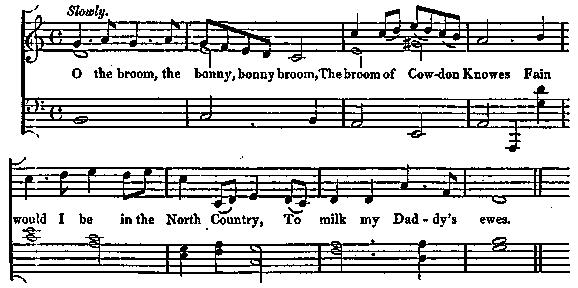Popular Music Of The Olden Time Vol 2
Ancient Songs, Ballads, & Dance Tunes, Sheet Music & Lyrics - online book
| Share page | Visit Us On FB |
|
|
||||
|
THE COMMONWEALTH. |
461 |
|||
|
|
||||
|
This was " Printed at London for F[rancis] G[rove] on Snow Hill." Again, in
the same Collection, i. 380, is " Slippery Will; or, The old Bachelor's Complaint,
with his advice to all yong men not to doe as he had done— His youthful time he spent away, That hs that will not when he may,
"Which makes him now this proverb say, When he would, he should have nay."
To the tune of The bonny, bonny broome." It commences— |
||||
|
|
||||
|
" Long have I liv'd a bachelor's life, And had no mind to marry,
But now I would fain have a wife, Either Doll, Kate, Sis, or Mary.
These four did love me very well, I had my choice of many;
Six stanzas, with a second part of eight |
But one did all the rest excell, And that was pretty Nanny.
0 young men all, to you J cry and call,
Make not too long delay, For if you will not when you may, When ye would, ye shall have nay" London, printed for E. B. |
|||
|
|
||||
|
Rox. Coll., ii. 575. "The forlorn Lover's Lament. To the tune of The long broom" Black-letter (printer's name cut off); beginning— " Sir, do not think these lines have flow'd From youthful hearts or hands," &c. There are a great number of English songs and ballads on the subject of " broom" and " bonny broom," but the enumeration would exceed the space I could devote to it. I will therefore cite but one more, and from a very early and scarce book. In Bale's Comedy concernynge the Lawes of Nature, 1538, in the second act, is a song, with a staff of five lines ruled for writing in the music, which is as follows:—
" Brom, brom, brom, brom, brom, Bromes for shoes and powcherynges,
Bye brom, bye, bye, Botes and buskins for new bromes.
Brom, brom, &c. |
||||
|
|
||||
 |
||||
|
|
||||
|
The first Scotch song of The broom of Cmvdenhnows was printed in Allan Ramsay's Tea Table Miscellany, 1724. It is there classed among the "new words by different hands;" and commences, " How blyth ilk morn was I to see." The subject of the older English burden is there retained.
The above version of the tune is not so good as that in The Beggars' Opera, or in Thomson's Orpheus Caledonius; but those copies are of more than seventy years later date. |
||||
|
|
||||